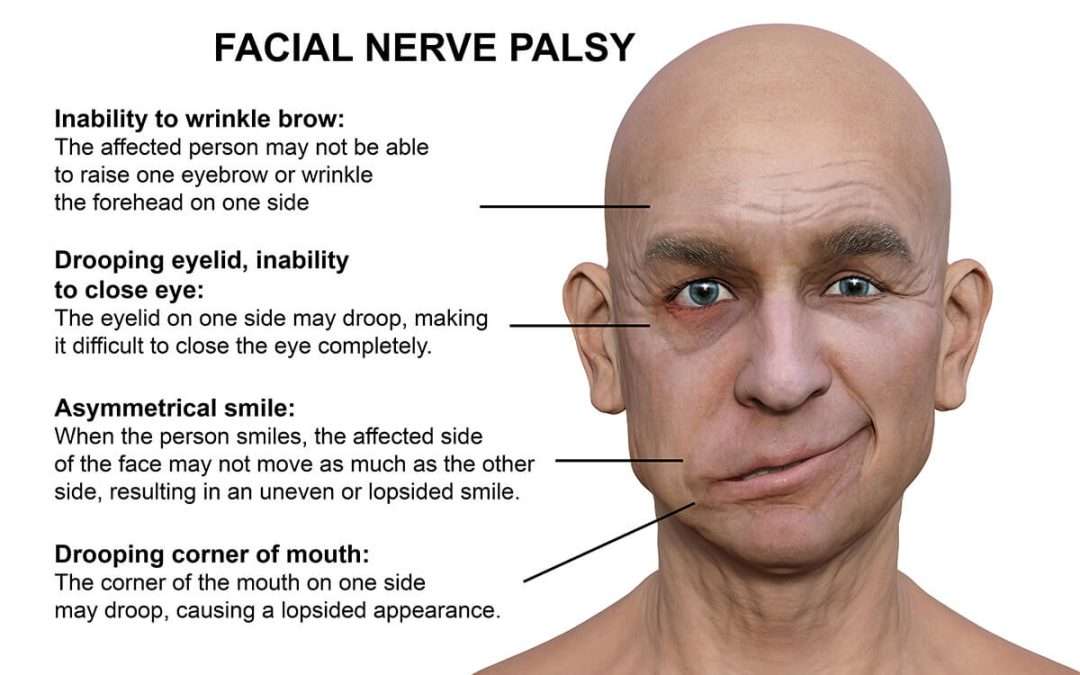Five years on from the global crisis that was the SARS-CoV-2 pandemic, scientists are still learning about the effects and interactions of coronavirus with the human body. One such link is that between Bell’s palsy, a neurological condition, with COVID and its vaccine.
What is Bell’s Palsy?
If one day you find one side of your face is suddenly not cooperating, you may either be having a stroke or have just been afflicted with Bell’s palsy. Neither are pleasant, but between the two, it would be preferable to be suffering the latter.
The exact causes of Bell’s palsy aren’t well understood, but doctors know that it involves impairment to the nerve that controls the muscles of the face, the facial nerve. This results in the characteristic symptoms of:
- Sudden weakness or paralysis affecting one side of the face
- Drooling from one corner of the mouth
- A drooping brow and mouth on one side
- An inability to close or blink the eye on one side
Being unable to control the muscles on one side of your face can conceivably lead to some issues. You may have difficulty with eating, drinking, and speaking. As the affected eye is unable to close fully, this can lead to irritation and watering. The facial nerve is also involved in taste and hearing, so a palsy to this nerve can result in sensitivity to loud noises, pain around the ear and jaw, and changes to your sense of taste.
Bell’s palsy can come on suddenly over a period of 48 to 72 hours. The symptoms range in severity, but typically begin to improve after a few weeks up to six months. However, sometimes, a degree of weakness to the facial muscles is permanent.
So, what could cause the poor facial nerve to suddenly give up? This isn’t well understood either, but possible causes may be compromised immunity, such as from stress or sleep deprivation, infection of the facial nerve causing inflammation, damage to the insulating sheath around the nerve fibers, or a viral infection – possibly such as COVID.
COVID and Bell’s Palsy
Although the predominant symptoms of a COVID infection are respiratory, such as coughing and shortness of breath, there are a decent number of case reports involving neurological complications. In fact, one review found that Bell’s palsy was the first symptom of a COVID infection in several cases.
A number of studies have suggested an association between a COVID infection or vaccination and developing Bell’s palsy. Researchers have observed a higher incidence of Bell’s among those vaccinated against COVID versus those given a placebo, however, more research is needed before announcing a definitive causative link. To break it down into finer detail, researchers reported:
- No significant difference in the strength of the association with Bell’s when comparing Pfizer/BioNTech and the Oxford/AstraZeneca vaccines
- During Moderna vaccination trials, three out of over 30,000 study participants developed Bell’s, but so did one person from the control group receiving the placebo
- There was no difference in the incidence of Bell’s palsy when comparing mRNA vaccines to non-mRNA formulations
Before you start to rethink whether the COVID vaccination is a good idea, researchers noted that actually being infected with coronavirus carried a higher risk of over 3-times more for causing Bell’s palsy than the vaccine did.
So, how does COVID-19 and its vaccine trigger a palsy to the facial nerve? One suggestion is that Bell’s palsy comes about from an autoimmune reaction related to the virus, causing the body’s immune system to attack its own healthy cells and damaging the facial nerve. Another explanation is swelling of the tissues surrounding the nerve pathway in response to a viral infection, which compresses the nerve.
COVID-19 is not the only viral infection associated with Bell’s palsy. Vaccines to seasonal influenza, H1N1 (swine flu), and meningococcal have also been linked with an increased risk of Bell’s. However, as the flu, H1N1 and meningococcal themselves are associated with death, a temporary droopy mouth from immunization is vastly preferable over an actual infection.
If you do develop Bell’s palsy, whether subsequent to a COVID infection or vaccination, or just out of the blue, be assured that the majority of cases resolve without permanent disability. Being seen by a doctor within 72 hours of symptoms and starting steroid treatment improves your chances of a full recovery.

